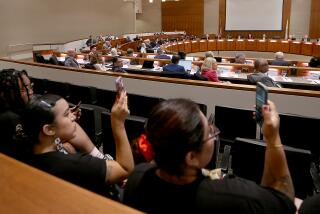It’s Country--but Is That Cool? : KCSN’s Format Switch Comes Up for Review This Fall
- Share via
The rancor that once swirled around KCSN-FM has calmed of late and business is good.
Two years after Cal State Northridge’s public radio station made a controversial switch to all-country music, listener support has increased and quarreling within the station’s management has lulled. A technical problem that caused spotty reception on campus appears soon to be resolved.
But another storm may be brewing on the horizon.
This fall, a newly formed executive board will review KCSN’s format and decide the station’s future. Such consideration could open old wounds as the group weighs opposing factors:
Traditional country music has won KCSN new fans and increased donations from the outside community. At the same time, traditional country music has alienated many of the university’s students and professors.
“This format is working,” said Ken Mills, newly hired as KCSN’s general manager. “But it’s very controversial on campus because traditional country music is not something that most people on campus can relate to. The radio station is not listened to by the vast majority of students.
“How important is that? That’s a question that has to be answered.”
KCSN (88.5) broadcasts to the San Fernando and Santa Clarita valleys. Although the station originates from campus, it is licensed as a community radio station, and school administrators have maintained that the community comes first when it comes to programming decisions.
In the past, KCSN played a mix of rock, country, classical and other styles.
One theory of the radio business holds that consistency is a key to success. KUSC-FM, which programs strictly classical music, is an example. Public station KCRW-FM, on the other hand, has been successful with widely varied programming.
KCSN’s former general manager decided in September, 1988, that a consistent format would be the station’s best shot at increasing its traditionally small audience.
Rock and modern country were ruled out because of the glut of such stations in Los Angeles. Classical and jazz weren’t options because KCSN is funded by the Corporation for Public Broadcasting and was not allowed to duplicate the programming of other public radio stations in the area. KUSC already had classical. KLON-FM already had jazz.
The Northridge station selected traditional country.
There was subsequent reaction from a citizens panel that acted as an adviser within KCSN’s management structure. The panel strongly advised that the all-country format be dropped. Faculty members and students criticized the choice as well. Heated debates were the order of the day.
“There were so many different factions pulling in so many different directions. They were jabbing and picking and carping,” said Robert Light, president emeritus of the Southern California Broadcasters Assn., who was president of the advisory panel. “If I’d had a gavel, I’d have broken the bloody thing.”
But management stuck by its decision, to mixed results. KCSN’s audience has remained small at 30,000 listeners each month. Yet the station’s spring fund-raising campaign garnered $38,000, up from $26,000 solicited the spring before.
“Even though we still have a small audience, it’s a sizable enough audience to support the station,” Mills said.
With some of KCSN’s financial problems soothed, school administrators next took action against the station’s infighting. The citizens advisory panel was disbanded by the CSUN administration and replaced by an executive board consisting of three faculty members and administrators, a student and three community representatives.
“We have a much smaller group,” said Light, who serves on the new board. “We have some control now. It’s much better.”
Not everyone is pleased.
“The controversy has died down but very little change has occurred,” said David Stibor, president of the Associated Students organization. “The programming of 1940s country music is not suited to a college. The students still feel that the station needs to look to the student audience and play some things that the students want.”
Some faculty members have complained that a college-run station should be presenting something more intellectually stimulating than country music, said Charles T. Lynch, a professor in the department of radio, TV and film, who added that he supports the present format.
The university’s administration declined to comment before receiving a report from the executive board. The board will first meet Oct. 5 but may not complete its review until early next year.
In the meantime, Mills is working to appease various factions. KCSN has added a blues show and a weekly program highlighting early rock ‘n’ roll.
“ ‘American roots’ is the phrase we use to describe our programming,” the general manager said. “We’ve broadened that phrase to include a few more roots. With specialized programs, like the blues program, maybe we can draw more student support.”
The station will also receive a technical boost this fall. Back in 1987, about the same time that KCSN switched to traditional country, it also switched to a mountaintop transmitter that increased its broadcast area. However, the transmitter could not reach certain “shadow” zones, most notably the university’s campus. Addition of the new equipment will allow radios to pick up KCSN at 88.3 on campus and in surrounding neighborhoods.
“That is psychologically very important,” Mills said. “It’s a frustrating situation not to be able to get the radio station in the parking lot in front of the radio station.”
All of this occurs as KCSN embarks on its fall fund-raising campaign, which begins today.
“Chances are greater that we’ll stick with the format we have,” said Light, looking forward to the board review. “It’s been quite satisfactory.”
More to Read
The biggest entertainment stories
Get our big stories about Hollywood, film, television, music, arts, culture and more right in your inbox as soon as they publish.
You may occasionally receive promotional content from the Los Angeles Times.











